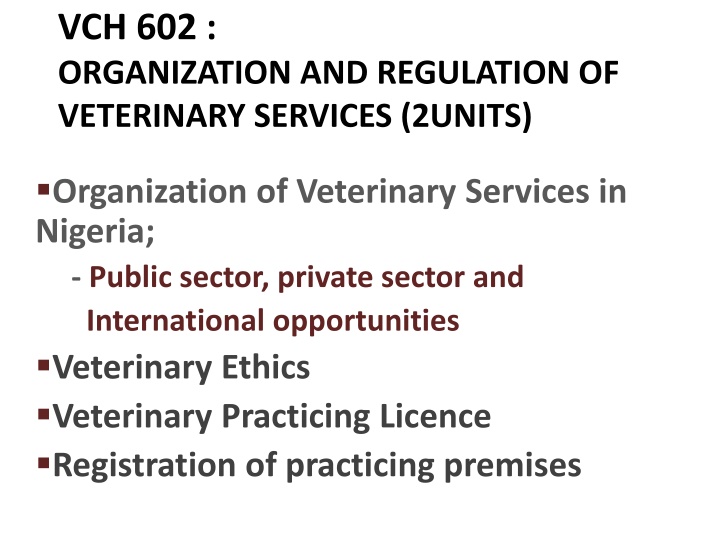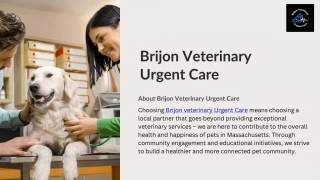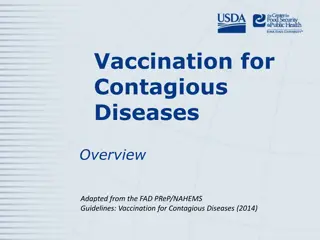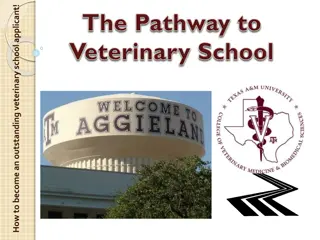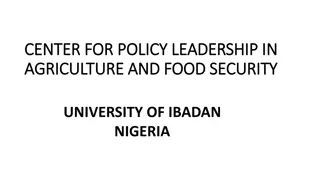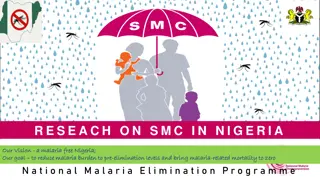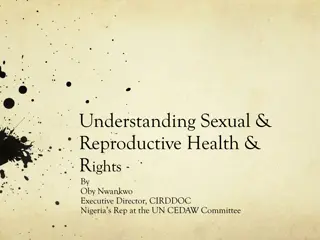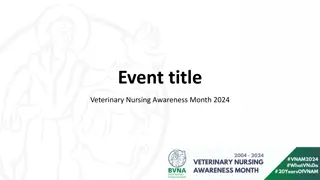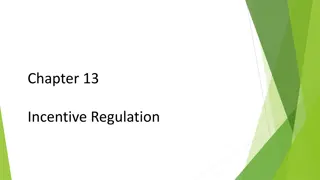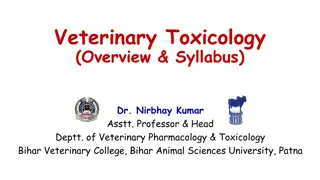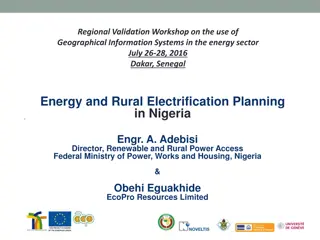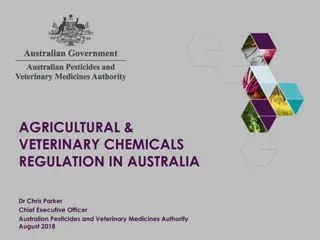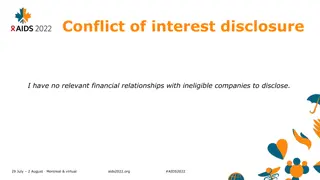Organization and Regulation of Veterinary Services in Nigeria
Veterinary services in Nigeria are structured around public and private sectors, offering opportunities for veterinarians in various fields such as private practice, pest control, consultancy, and more. The public sector includes government employment and research institutes, while the private sector involves practices, farms, pharmaceutical companies, and feed mills. This comprehensive setup highlights the diverse avenues for veterinary professionals to contribute to animal health and welfare in the country.
Download Presentation

Please find below an Image/Link to download the presentation.
The content on the website is provided AS IS for your information and personal use only. It may not be sold, licensed, or shared on other websites without obtaining consent from the author.If you encounter any issues during the download, it is possible that the publisher has removed the file from their server.
You are allowed to download the files provided on this website for personal or commercial use, subject to the condition that they are used lawfully. All files are the property of their respective owners.
The content on the website is provided AS IS for your information and personal use only. It may not be sold, licensed, or shared on other websites without obtaining consent from the author.
E N D
Presentation Transcript
VCH 602 : ORGANIZATION AND REGULATION OF VETERINARY SERVICES (2UNITS) Organization of Veterinary Services in Nigeria; - Public sector, private sector and International opportunities Veterinary Ethics Veterinary Practicing Licence Registration of practicing premises
Organization of Veterinary Services in Nigeria Veterinary services in Nigeria started in 1914 Organizational structure based mainly on public and private sector Public structure Employment of Veterinarians by the government (Federal, State and to a lesser extent, Local government) Private sector Set-up of practice by Veterinarians for the purpose of conducting business within the confines of Veterinary profession
Private Sector Private practice Self-practice (formally designated area for the practice of Veterinary Medicine Work for others in the set-up Veterinarians can combine resources to jointly have a practice (based on trust; integrity is the watchword) Veterinary Doctors can do locum i.e. work on agreed hrs/wk/practice. Allows for flexibility and expertise can be transferred between practices. (enrich Veterinarians and the profession) Pest control services House calls and consultancy services Pet shop/mart, meat mart Kernels for dog breeding (may include dog training) Veterinary Diagnostic Centres
Private Sector Farms Veterinarians can have livestock, poultry farms Be employed by others in the sector Fish farming (against the background knowledge of fish diseases and management) The organised Private Sector Banks loan section and scrutinizing feasibility reports Pharmaceutical companies Employed for the production of Veterinary drugs Marketing and distribution of Veterinary drugs Feed-mill Veterinarians can have their own feed mills Consultant to feed millers Employed in the feed milling industry
Public Sector The Federal Livestock Department Headquarters at Abuja Coordinates Veterinary services (especially relating to epidemiology and disease prevention) Epidemiological Unit Livestock Investigation and Breeding Centres The Federal Government established Research Institutes Research to animal diseases for prevention and control and animal welfare, increase production of food animals The National Veterinary Research Institute (NVRI) National Institute for Trypanosomiasis Research (NITR) National Animal Production Research Institute (NAPRI)
Public Sector Veterinary Schools For producing qualified manpower Research University of Ibadan University of Nigeria, Nsukka Ahmadu Bello University, Zaria Usmanu Dan Fodiyo University, Sokoto University of Maiduguri, Maiduguri University of Agriculture, Abeokuta University of Agriculture, Umudike University of Agriculture, Markudi
The Military Care for dogs and horses used at the Military base Airport Prevention and transmission of diseases across borders Animals imported must have authenticated documents of disease-free status If not available, quarantine procedures must be put in place for certification National Agency for Food and Drug Administration and Control (NAFDAC) Polo Zoological Parks
State Veterinary Establishments and Related Bodies State governments employ services of Veterinarians Diagnosis and treatment of animal diseases Control of zoonotic diseases Safeguard the health of the populace Veterinarians employed this way are known as Veterinary Officers Veterinary Clinics Public Health Unit (abattoirs and slaughter slabs) Animal Control Posts
State Veterinary Establishments and Related Bodies The Veterinary Clinic Diagnosis, treatment and prevention of diseases (large and small animals) Issuing health certificates to export animals
The Public Health Unit Abattoirs and slaughter slabs Inspection of food animals prior to and after slaughter Safe and wholesome meats are produced for the consuming populace
Animal Control Post State Ministry designated areas manned by Veterinarians for inspection of trade animals To ensure that healthy animals are brought to the state To prevent the transmission of diseases from one locality to the other
Opportunities for employment outside the shores of the country Essentials Need to sit for qualifying examinations for registration E.g. England; Royal College of Veterinary Surgeons (RCVS) U.S.A ; examination depends on each state of the country i.e. State by State Need for some months of acclimatization prior to sitting for examination
Opportunities for employment outside the shores of the country RCVS qualified Veterinarian can work in any of the following places in the U.K Veterinary General Practice Urban and Rural Practice Government Services State Veterinary Service Veterinary Field Service Veterinary Investigation Service Executive Agencies Central Veterinary Laboratory (research and consultative support fields) Veterinary Medicines Directorate (licensing of Veterinary Medicines
Veterinary Ethics Science of healthy relationships Veterinary Code of Ethics is concerned with the professional s relationships His colleagues, patients, clients, other professionals, the legal authorities, the law enforcement agents and public at large Ethical approaches ensure orderliness, durable, honourable, peace and great sense of responsibility in the discharge of professional function towards meeting the overall well-being of the society Code provides an essential link between what is strictly legal and what is simply equitable in contemporary and ultimate social sense and in accordance with the principles of natural justice
Veterinary Ethics Ethics in matters relating to the reputation of the profession A Veterinarian s behaviour is said to be unethical if it has fallen short of standards set for the profession Standards articulated in the Veterinary Oath which places every Veterinarian under an obligation to maintain the interests, honour and dignity of the Veterinary profession
Veterinary Ethics Professional premises Professional premises of a Veterinarian should at all times be in a proper condition for carrying out professional duties Staffing, facilities and equipment should be maintained at an appropriate standard Canvassing and Touting for Practice It is unethical for a Veterinarian to canvas directly or indirectly or tout for practice. This does not in any way preclude a Veterinarian from applying for any professional appointments or consultancy positions advertised as vacant Professional appointments should however not be the subject of tendering, as this may lower the image of the profession
Veterinary Ethics Ethical relationships amongst Veterinarians Veterinarians should always make deliberate efforts to be on good terms with one another. Avoidance of rancour is essential for the maintenance of the reputation of members Careful consideration should be always be given to all forms of relationships with a view to ensuring common and honourable, peaceful and harmonious dealings In accordance with the rule of law and the dictates of healthy conscience It is unethical for a Veterinarian to be involved in the generation and propagation of falsehood about his colleague or any client at all Courtesy is also an integral part of ethical relationships between Veterinarians Mutual respect between Veterinarians is thus considered ethical and part of good education
Veterinary Ethics Ethical aspects of the use of Titles, Degrees and Descriptions Only persons that has acquired Veterinary degrees and qualifications and has been registered by the Veterinary Council of Nigeria has the right to use the title VETERINARIAN This is in accordance with the Veterinary Surgeons Degree No. 37 of 1969 An unregistered or deregistered person cannot legally arrogate to himself the title VETERINARIAN or VETERINARY SURGEON in Nigeria; this will not only be unethical but also illegal
Veterinary Ethics Ethical relations between a Veterinarian and his clients Good human relationship and work ethics would be of immense importance to the general image of the profession in the eyes of the public Relationship between the Veterinarian and his client is thus a major subject of ethical consideration Professionally satisfactory service will obviously be enhanced by sustained good relationship between him and his client. An atmosphere conducive to professional practice, prompt attention, except in unavoidable situations and refusal to be provoked in tense or difficult situations will all contribute to the satisfaction given to the client The interest of the public is always paramount in the estimations of a good professional
Veterinary Ethics Ethical relations between Veterinarians and their patients Ethical considerations make the relationship between a Veterinarian and his patient very important especially as communication between the two is limited The Veterinarians knowledge of animal psychology should enable him cope with an un-cooperative patient without reflecting anger or harshness in the handling The laws of the country allow the Veterinary profession to have a virtual monopoly of the diagnosis and treatment of animals in order to protect the animals against incompetent and unqualified persons This priviledge should be justified
Veterinary Ethics Ethical relationships relating to the Veterinarian as a witness in a law court The Veterinarian may be a witness under two different and unrelated circumstances In one instance, he may be called upon in his capacity as a citizen to give evidence relating to his personal knowledge or as an eye-witness Here there seems to be no problems, provided the Vet is convinced that he is acting as required by law On the other, he may be invited to act as an expert witness because of his professional status Before agreeing to act as a witness, he will be advised to consider whether his knowledge and experience are within the subject. He is advised to be convinced that the evidence that he will be asked to interpret has a sufficiently sound scientific basis to enable a well- founded opinion to be made In either instance, the evidence of the Vet must always be given fairly and with the paramount intention that justice shall be done
